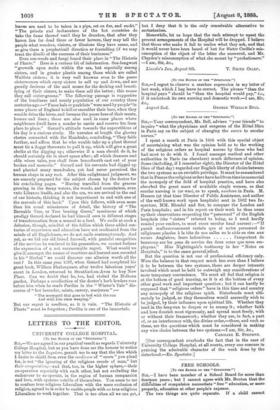LTO THE EDITOR OF TEE "SPECTATOR."'
Sin,—Your correspondent, Mr. Bell, advises "your friends " to inquire "what the physicians and surgeons of the Hotel Dieu in Paris say on the subject of changing the smurs to secular nurses."
I spent a month at Paris in 1868 with this special object of ascertaining what was the opinion held as to the working of the religious orders as hospital nurses by those who had had most to do with it. I found amongst medical and other authorities in Paris (as elsewhere) much difference of opinion. Some (including, if I remember right), the Director of the HOtel Dien of that day) regarded our English liberty of choice between the two systems as an enviable privilege. It mast be remembered that in France the religiocuiorders have had from time immemorial the monopoly of the field of hospital practice, and have also absorbed the great mass of available single women, so that secular nursing is (or was), so to speak, nowhere in Paris. M. Hasson (at that time Director of Public Assistance, and author of the well-known work upon hospitals) sent in 1862 two In- spectors, MM. Blondel and Ser, to compare the London and Paris hospitals ; and in his report on their work he thus sums up their observations respecting the "personnel" of the English hospitals (the " sisters " referred to being, as I need hardly remind your readers, in most cases secular head nurses) :—"Il parait malheureusement certain Tie si notre personnel de- religieuses placees A. la tete de nos salles ne le cede en rien aux
scours Anglaises, leurs infirmieres l'emportent de beaucoup sur lea gene de service des deux sexes que nous em- ployons." Miss Nightingale's testimony in her "Notes on Hospitals," is to the same general:effect.
But the question is not one of professional efficiency only. Were the balance in that respect much less even than I believe it to be between the two systems, there are deeper interests involved which must be held to outweigh any considerations of mere temporary convenience. We must all feel that religion is at the bottom of good nursing, as it is at the bottom of every other good work and important question ; but it can hardly be- supposed that "religions orders" have in this time and country any monopoly of the religious spirit. Sisterhoods must ulti- mately be judged, as they themselves would assuredly wish to- be judged, by their influence upon spiritual life. Whether they tend in the long-run to deepen or to cramp it ; whether faith and love flourish most vigorously, and spread most freely, with or without their framework; whether they are, in fact, a part of, or an interference with, the divine order,—these, and such as these, are the questions which must be considered in making any wise choice between the two systems.—I am, Sir, &c.,
CAROLINE E. STEPHEN.
[Oar correspondent overlooks the fact that in the case of University College Hospital, at all events, every one concurs in praising the admirable character of the work done by the sisterhood.—En. Spectator.]


































 Previous page
Previous page